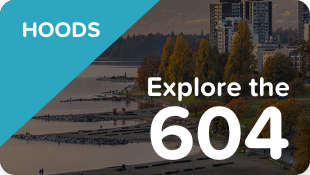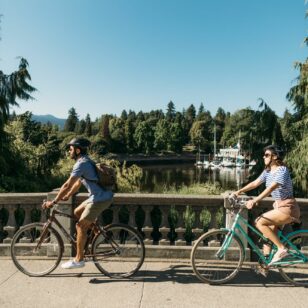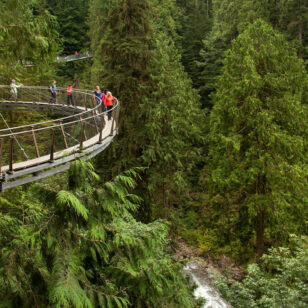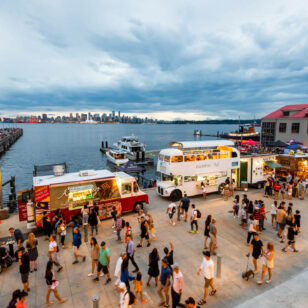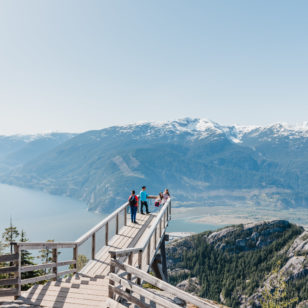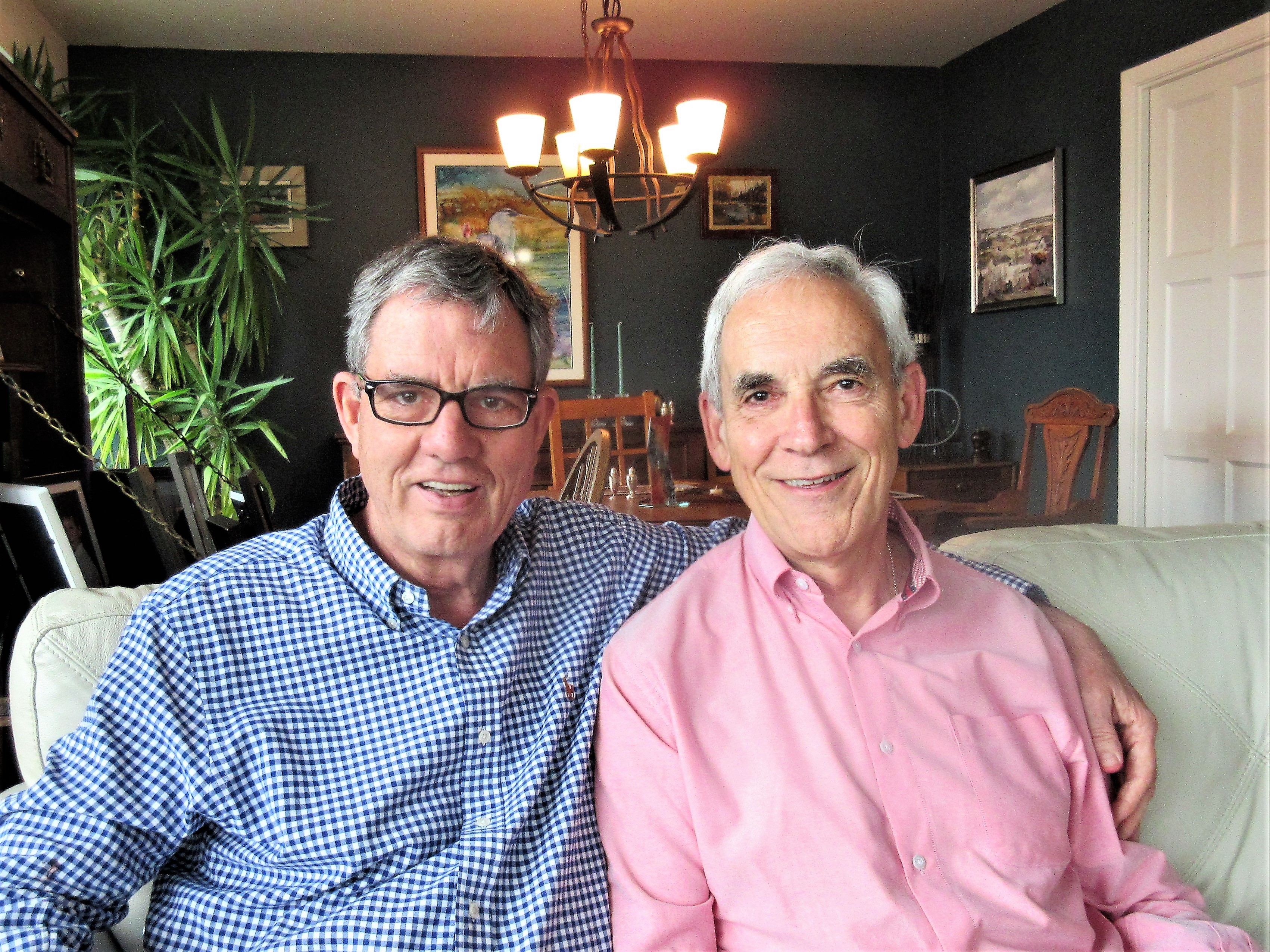
By Angus Praught
Very Reverend Dr. Gary Paterson and Deputy Mayor Tim Stevenson are a high-profile Vancouver couple, and champions of LGBTQ2+ rights and freedoms. For decades, they have been at the forefront of life-changing legislature and religious reforms that have helped shape Vancouver into the diverse and inclusive city it is today.
In part 2 of this series, we will be speaking with Very Reverend Dr. Gary Paterson, a senior minister at St. Andrew’s Wesley United Church in downtown Vancouver and past Moderator of the United Church of Canada. He is the first openly gay person to take the position of moderator in the church, and the first in the world to lead a major Christian denomination.
Angus Praught: Good morning Reverend Paterson. Can you tell us a little about yourself and your current position with the United Church of Canada?
Very Reverend Dr. Gary Paterson: Well, I’m an ordained minister in the United Church of Canada, and have been now for 41 years. I’m currently serving in St. Andrew’s Wesley United Church in the downtown core at the intersection of Nelson and Burrard, and I’ve been there since 2005. I started off as the lead or senior minister, but last summer I decided I would go to half-time, let someone else take on the larger responsibility, and continue on administering in more of an assistant roll.
AP: When you were first ordained by the United Church back in 1977, I don’t believe anyone was able to be openly gay at that time, and you served on the committee that made the first report on ministry and sexual orientation. Can you tell us about this, and how and when this all changed?
VRDGP: I was ordained in 1977, and was what you could describe as a confused gay man, a closeted gay man, or bisexual gay man. I had been married and had a couple of children by that time, but was wrestling with my own sense of sexuality. I had long discussions about my sexuality with my wife before we got married, saying that’s who I am, and we are taking a chance. I was ordained a happy heterosexual, young, married and with child, and off we went.
The United Church in 1980 went into its first foray into the general area of sexuality, produced a report on sexuality, one chapter of which included homosexuality. The decision of the church was to train educators from across the country to enable congregational groups to deal with this, all the way from human sexuality, to premarital homosexuality, and I was one of the educators for that. It was interesting because it came at the same time as I was doing my own internal wrestling.
My marriage ended in 1982 and I partnered shortly thereafter with Tim [Stevenson], and I was not completely out; I was in what you would call a glass closet. So, I was known by people as a gay person in ministry, and as Tim’s partner, but wasn’t officially out. In 1984 The United Church developed a second report that was specifically looking at the possibility of ordaining openly gay or lesbian persons into ministry, and they approached me and asked if I would be willing to be part of that, because they knew that I was at least half out. I said yes, with some apprehension, but was ready for that next step, and felt the importance of having a gay voice among the group of church folk who were wrestling with this issue.
AP: I understand that your husband Tim Stevenson was the first openly gay person to be ordained in the United Church. Were you there when this happened and can you talk a bit about that day?
VRDGP: I most certainly was there, and it was an incredible highlight. I wept through part of the ceremony, and cheered through the other parts. It was also an occasion to look back at history, and to recognize what a long process this had been for Tim and I, as well as the United Church.
In particular I look back to the national gathering in Victoria in 1988, when the church had to wrestle with whether or not it would include LGBT folk. It was highly controversial, and the reaction from people right across the church was highly negative. It was such an extraordinary moment; I would call it the working of the spirit. The church made a positive decision, and opened the door for someone like Tim to be ordained. Tim took a step back, partly just to let the church get used to the idea, and then proceeded in 1992. It felt like a real breakthrough moment, and at that time I was ministering in the downtown Eastside First United Church. We were still in some ways in a glass closet, but for many people across the church, Tim and I were known as Mr. and Mr. Gay United Church. A number of people came up to me later, over the years, and said that when they thought of gay people sometimes it just felt scary in the abstract, and then we thought of you and Tim and thought, oh, that’s what we’re talking about, and it feels okay.
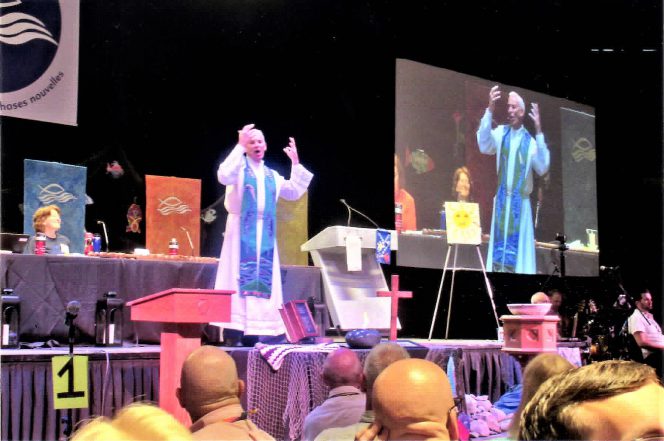
Image Courtesy of Very Reverend Dr. Gary Paterson
AP: As a result are there many LGBTQ2+ people ordained ministers today?
VRDGP: Yes there are actually quite a few. I don’t know an exact number, but it feels more and more comfortable for LGBT folk who have already been ordained to come out to their congregations, or to begin the process and recognized there was a space and an affirmation for them.
One of the most interesting things over the past couple of years was that two of our larger conferences, one in southern Ontario in the city of London, and one in the Maritimes, had been very conservative and very strongly opposed to the inclusion of LGBT people. Both made decisions to become affirming, and said that they were going to celebrate the gifts that LGBT people bring as members and lay people, and as ordained leaders within the church. So it’s been incredibly exciting, where people have transferred in from other denominations that recognize that there is a home here for them. Probably that reflects a shift in their own theology which is more progressive, open and liberal, but also to a place where they can just take a deep breath and say, hah, I can just stop worrying about that, get on to the business of ministry, and being present with people as they undertake their spiritual journey.
AP: On another historic note, fast-forwarding to 2012, you were the first openly gay person to be elected to the post as moderator of the United Church of Canada, and the first in the world to lead a major Christian denomination. Can you tell us if your sexuality was an issue or consideration in the process, and did you face any opposition along the way?
VRDGP: Well, it was indeed a very historic moment. I was one of 15 nominees, and I really didn’t think that I would get elected. Although it was not openly talked about, the fact that I was gay, and openly partnered with Tim, would in fact be a worry for some people; they may not voice it, but it would be reflected in the balloting.
The irony was that I was in fact elected, and most people who spoke to me said that your sexuality was just not an issue; we were looking at you, the gifts that you might be able to bring to the church and found the role of moderator is to enliven the church.
I spent about a third of my time on the road across the country and visiting international partners. I found that within Canada there was almost no opposition, although some people were concerned that I would be a one-trick pony, as in I would always try to raise this issue, or bring it in as an axe edge. I said no, I’m here to serve in the fullness of who I am for what the church needs. Sexuality is part of who I am and I’m not going to try and hide it; I will be responding to questions, so if there are problems with that, we’ll deal with it. People were relieved about that, and it gave them permission on a number of occasions to speak specifically on that issue.
One place that I found that there was opposition was with international partners. The role of Moderator of Canada is in fact not only to enliven the church within Canada, but to make connections with and visit our international partners, and we have partnerships with over 130 different organizations or churches around the globe. It was the turn of the moderator to visit our partner churches in Africa, and the African partners said, “please don’t come”. At first I was a little taken aback, and said I don’t necessarily intend or need to talk about homosexuality, or my own story and they said that you are so fully out, it will inevitably become an issue, the press will do their homework and there you will be. As a white, former colonial representative, you may just add more oil onto a struggle that is already ongoing, and more to the point, the people who meet you and are supportive, may be in danger once you leave, so can you trust us, that we are doing our work. In fact, one archbishop said they were actually bringing in priests from South Africa, where homosexuality had been legalized, and they were trying to do some progressive work and prepare people for it. Interestingly enough, my successor, Jordan Cantwell, is an out lesbian and by her time they had finally said yes, they were ready for a visit from a moderator.
A second aspect, which is perhaps more hopeful from my point of view, is that our Latin American partners, Columbia and Cuba, which had a history of being apprehensive around the whole topic of homosexuality, reflecting their own theology, and perhaps the machismo attitude that pervades part of Latin culture, specifically asked if I would come and tell the story of the United Church, and tell my own story. Tim was asked to come along as well to talk about what it meant to build an inclusive community. That was quite heartening as that would never have happened a few years back. Normally moderators go to listen and are not asked to do workshops. We went to Columbia and did five different workshops in several different locations, and a workshop at an Evangelical seminary in Cuba. We were incredibly well received; the change is happening slowly, but this felt like a real breakthrough.
I want to clarify one point; when I was elected I was certainly the first openly gay person elected as the moderator for the United Church. For those who don’t know the United Church, my quick line of description is: imagine a baby pope with no power. The Metropolitan Community Church of course has served the LGBT for a number of years, and they have elected leaders that are openly gay or lesbian, but in terms of major denominations with historic roots, such as orthodox, protestant or catholic, I would have been the first openly gay person in the world to have been elected to lead a major denomination.
AP: In my research I noticed that initially you did not make being gay the center of your position, but rather as a matter of fact, if asked. Do you recall if it had much of an impact on your associates, when they actually found out?
VRDGP: By the time I was elected it was a known fact that I was gay, so it didn’t come as a surprise to most people. I think what people discovered though, was me as a person. It put a face on a person, of how or what a gay person might be. It normalized it, incredibly right across the country, and it became just one more step in it becoming a non-issue in terms of it being a barrier, and also recognition that it’s a gift.
AP: Another event of note is when the church started to participate in the Vancouver Pride Parade. Can you tell us how and when this began?
VRDGP: We made a decision with the board, after my being there for three or four years that we should be in the Pride Parade, that we should be a presence there, and once again proclaim loudly and proudly that gay and Christian can go hand in glove, and that people can be affirmed and welcomed.
We weren’t so sure at first what this would look like. I at first imagined a car, with perhaps twenty people walking, and perhaps a banner, but we asked a real go-getter in the congregation to undertake this project. He found some pockets of money, perhaps from some gay people in the congregation, and then came to me and presented that he had just rented a seventy-six foot flatbed truck, they had built a full on replica of the church, complete with stained glass, hired a professional recording studio to record our gospel choir, that would be riding on the float, with pews actually bolted onto the back of the truck, and that we would sing our way through the whole pride parade. We had eighty-six people from the congregation who were walking with the float, including little two year olds, and an eighty-six year old member riding on the float, and everyone was so excited and proud, that we went on to win a prize for community participation.
AP: The church has also welcomed a number of milestones for the LGBTQ2 + community including the Spirit Pride conference that takes place at St. Andrews Wesley Church. Can you tell us a bit about it, and if you have been involved on any level?
VRDGP: For the past two or three years the church made a decision not to participate in the parade, not for any particular reason, but perhaps because they wanted to focus their energy on a larger, and broader, more educational event, so they developed the concept of a conference called Spirit Pride, with an invitation to people from across the city to take a look at issues pertaining to sexuality and spirituality, particularly spirituality from the viewpoint of the LGBT community. They invited speakers from across the country, and from our neighbour to the south, that would highlight issues and deal with some of the contradictions. There was a very key planning committee, I was partly involved as background support, but in fact they were really able to carry it themselves. Curt Allison, who is on staff, and does the work with the LGBT community, was really the backbone of it.
One of the highlights for me came last year, when we had an inter-faith panel, addressing questions of where the scriptures and theological positions of their respective faiths, found themselves on the issue of homosexuality. So we had Peter Elliot, who was the dean of Christchurch Cathedral, representing the Christian tradition, Rabbi Laura Duhan Kaplan, who is straight, but an incredible and strong ally, and then a gay imam who came from Toronto. The Muslim community here in Vancouver is organizing, but facing a very conservative environment, and this imam is one of the few who is out. The panel spoke, and I was the moderator; we dealt with questions, and it was quite extraordinary to hear how each one of these Abrahamic traditions, at one level could be seen as against, and historically were opposed to the LGBT community, but how in fact, with a different reading of tradition and the scriptures, the understanding of God’s call came out so positively and affirming, which was just a highlight moment.

AP: We understand that you are now in semi-retirement. Can you tell us if, and how much you will be still involved with the church?
VRDGP: Well technically, and I guess the word is technically retired, but I immediately started working half-time, so I’m still at St. Andrew’s Wesley. I still take half of the worship services and do some of the adult education, and a lot of the pastoral care, so I feel that I’m still very much involved. The real challenge is to figure out how to keep it to half time. I love the work so much, and there’s so much possibility, that I just find myself more and more involved. What I’ve tried to do to find a balance, try to take more time out with Tim for travel, and do more events with the larger church. For instance, I won’t be with this year’s Spirit Conference, much to my regret, but I have to be at our national council meeting where I will have a role as past Moderator, and it will be one of my larger church responsibilities once again. I don’t think there will be any particular LGBT issues, but a voice with wisdom, and I’ll do what I can at that point.
AP: In closing do you have any advice for anyone still struggling with their identity and religious beliefs?
VRDGP: I think it is so important for people to know, that being LGBTQ and Christian is not a contradiction, and despite what people may have heard through the media, or perhaps from their own experience with family, or growing up with neighbours. I think it is so important for people to be able to reclaim their faith journey and to do it loudly and proudly as an LGBTQ person, fully out and fully affirmed. I would have advice for people to find a home, a denomination, a congregation that actually affirms you.
I find myself very critical of traditions, that say we love the sinner but hate the sin. I think that’s poppycock; I think in fact if an LGBTQ person finds themselves in such an environment, you hear all the sub-messages that you’re sick, you should be changed, you are a sinner, shut up we don’t want to know, or don’t ask don’t tell. I don’t think that one can actually feel connected to God, when you keep hearing these negative messages. I’d partly say, come home, and it doesn’t necessarily mean to the United Church, there are also other traditions that are affirming; Unitarian, many branches of the Anglican Church, and there are separate congregations within other denominations, that in and of themselves may be negative, but ask the question. So often I am meeting people who didn’t ask the question, and thought it was fine, affirming and accepting, and then suddenly they got caught by surprise when something was said from the pulpit, that homosexuality is a sin, we’re against it and the bible says so. It’s such a blow to them, so I think people need to be intentional and conscious, and it’s so important that we have clear and loud voices that affirm the LGBTQ community within the context of faith.
AP: Thank you very much.
VRDGP: It’s been a pleasure, and you can tell it’s a real passion on mine, to talk both about faith and to also talk about the inclusion and welcoming of the LGBTQ community.
2018 is turning out to be another year of firsts for the city of Vancouver, as well as a year of major political change. It will be fascinating to see what the future holds.
St. Andrew’s Wesley Church: standrewswesley.com
Spirit Pride Conference: spiritpride.org
The United Church of Canada: united-church.ca
You can read Part 1 of this series here.
Angus Praught is president of Gayvan.com Travel Marketing, a Vancouver-based company featuring LGBTQ2+ welcoming destinations, in the Vancouver region, Canada, and beyond.










